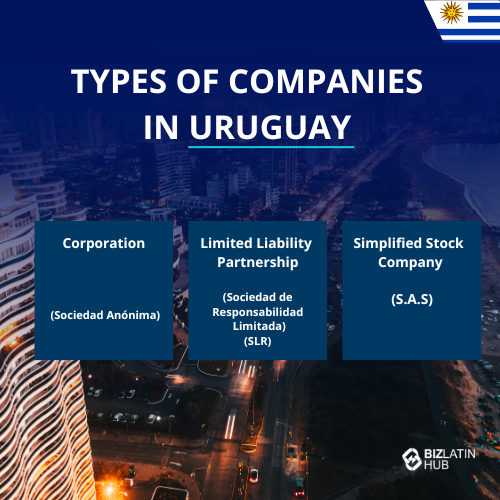
Company Formation in Uruguay: Incorporation Guide for Foreign Investors
Registering a business in Uruguay offers entrepreneurs a straightforward and efficient way to tap into the country’s dynamic opportunities and favorable business environment. With a strong regulatory framework and a pro-business climate, Uruguay provides a solid foundation for market entry and long-term success. To set up a business in Uruguay also allows investors to take advantage of a stable and supportive market. At Biz Latin Hub, our expertise in regional legal and cultural nuances ensures a seamless setup process.
Key Takeaways On How To Set Up a Business in Uruguay
| Is Foreign Ownership Permitted? | Foreign nationals are allowed to set up a business in Uruguay with 100% ownership. |
| How to Start a Business in Uruguay Step by Step: | Step 1 – Approval of the company’s bylaws by The National Audit Office (AIN). Step 2 – The National Trade Register (RNC) needs to register the bylaws. Step 3 – The Official Gazette and another newspaper need to publish them in the form of an excerpt. Step 4 – Register your company in Urugauy’s National Tax Administration Office (DGI) to be granted a unique taxpayer number (RUT). Step 5 – Register with the Ministry of Work and Social Security (MTSS), the Social Security Administration (BPS) Step 6- Register the Ultimate Beneficiary Owner (UBO) with the state bank |
| What Are The Common Entity Types In Uruguay? | Corporation (Sociedad Anónima – S.A.) Limited Liability Partnership (Sociedad de Responsabilidad Limitada – S.R.L.) Simplified Stock Company (S.A.S) |
| Can You Set Up a Foreign Branch Office? | Companies can incorporate a branch in Uruguay to align with parent operations. |
| Why Set-up a Business in Uruguay? | The legal requirements to start a business in Uruguay are straight forward, with well established trade agreements and flourishing internal-external sectors. |
How to Incorporate a Company in Uruguay – Step-by-Step
With the right support, the company formation process of an S.A. or an S.R.L. can be relatively quick and straightforward. No minimum amount of capital is needed, except for financial and insurance companies. Several steps to set up a business in Uruguay need to be taken:
- Step 1 – Approval of the company’s bylaws by The National Audit Office (AIN).
- Step 2 – The National Trade Register (RNC) needs to register the bylaws.
- Step 3 – The Official Gazette and another newspaper need to publish them in the form of an excerpt.
- Step 4 – Register your companies in The National Tax Administration Office (DGI) to be granted a unique taxpayer number (RUT).
- Step 5 – Register with the Ministry of Work and Social Security (MTSS), the Social Security Administration (BPS)
- Step 6- Register the Ultimate Beneficiary Owner (UBO) with the state bank
Step 1: Company bylaws need to be approved
Once you write the bylaws of your company, you need to validate them with the National Audit Office (AIN). The audit office will make sure that they are legally compliant and make sure that everything is in order according to the law of the land.
Step 2: Register the bylaws
After the validation by the National Audit Office, you will need to bring your bylaws for registration to the National Trade Register (RNC). This will form the basis of your company’s operation going forwards. Although they can later be changed, this requires administrative change and is something you probably want to avoid.
Step 3: Publish your bylaws
The registration of your bylaws will be confirmed by being published in the Official Gazette and another national newspaper. This means that you are fully and publically registered in an open and transparent manner, as well as allowing anyone to inspect said bylaws.
Step 4: Register with National Tax Administration Office (DGI)
Your Business is now nearly registered in Uruguay, but to start having commercial activity in compliance with local tax regulations, you will have to register your company in the National Tax Administration Office (DGI) to obtain your taxpayer number (RUT). This is essential for all official business in the country, such as obtaining a corporate bank account.
Step 5: Register with state labor authorities
From now your company is fully registered in Uruguay, but to start your commercial activity hiring personnel, you will have to register your company with the different work and social administrations, involving the Ministry of Work and Social Security (MTSS), and the Social Security Administration (BPS).
Step 6: Register the Ultimate Beneficiary Owner (UBO)
To adhere with increasing Anti Money Laundering (AML) regulations you are required to notify and register the UBO of the company with the central bank. This is becoming ever more important as the country falls into line with global norms of accounting and fiscal responsibility. You will need to maintain these records as an ongoing project.

Types of Legal Entities in Uruguay
Small-and-medium-sized enterprises (SMEs) are the most important company types in Uruguay, with more than 170,000 SMEs providing jobs for 60% of the working population, according to the BBVA. But what are the types of legal entities investors need to consider to set up a business in Uruguay?
1. Corporation (Sociedad Anónima – S.A.)
There are two types of corporations:
- Open Corporation: companies that use public savings or have shares listed on the Montevideo Stock Exchange (BVM).
- Closed Corporation: has a limited number of shareholders and stocks are not traded publicly on the BVM.
Generally, an S.A. requires a minimum of two founding members to set up a business in Uruguay, who can be either residents or foreigners. In addition, management is mostly executed by a board of directors who can be local or foreign individuals domiciled inside or outside Uruguay. A considerable advantage of the SA is that there are no limitations to the activities that can be conducted except for financial and insurance operations.

2. Limited Liability Partnership (Sociedad de Responsabilidad Limitada – S.R.L.)
In Uruguay, an S.R.L. (Sociedad de Responsabilidad Limitada) is the preferred entity type for SMEs, making it the most commonly used business structure in the country. Similar to corporations, S.R.L.s face no restrictions on the activities they can undertake. The entity can have between 2 and 50 partners, offering flexibility for various business sizes.
3. Simplified Stock Company (S.A.S)
With the introduction of the S.A.S in Uruguay, a more agile and accessible business structure has emerged, offering foreign executives an attractive avenue for market entry and expansion. Its legal status and assets are independent of business owners, reducing personal liability for company activities. It is the most popular company type in the country.
The S.A.S has a big disadvantage, which is the social contributions paid by its administrator, equivalent to a minimum of approximately USD$ 250 when the company has no employees and the higher salary of its employees when it has them.
Foreign branch office registration as an Alternative to set up a business in Uruguay
An alternative to forming an independent local company is the establishment of a foreign branch office in Uruguay. They are theoretically free to perform any business activities but usually follow the business strategy conducted by the parent company. Nevertheless, the company needs to be incorporated to conduct its operations.
The incorporation process is similar to the steps previously outlined and the foreign branch office needs to be registered in the National Trade Register (RNC) stating the parent company’s name, domicile, capital and its managers. Furthermore, registries in the MTSS, BPS and BSE are obligatory for the hiring of dependent employers to set up a business in Uruguay.
Comparison Table – Uruguay Company Types
| Legal Structure | Ideal For | Shareholder Requirements | Advantages |
|---|---|---|---|
| SA | Large enterprises | Minimum 2 | Shareholder anonymity, can issue shares |
| SRL | Small-medium businesses | Minimum 2 | Simplified management and accounting requirements |
| Branch Office | Foreign parent companies | Must have foreign parent | Direct extension of a foreign entity, no capital required locally |
Legal Requirements to Register a Business in Uruguay
Foreign investors incorporating a business in Uruguay are legally required to appoint a local legal representative. This representative must be a resident of Uruguay (either a Uruguayan national or someone holding a valid residence visa) and will serve as the company’s formal point of contact with authorities. They are responsible for:
- Signing contracts and official documents
- Representing the company in dealings with tax, labor, and government entities
- Ensuring the company remains compliant with national regulations
Once the company is formed, it must register with the Dirección General Impositiva (DGI) to obtain a RUT (Registro Único Tributario) — the unique tax ID used for invoicing, tax declarations, and financial reporting.
If the company intends to hire staff, it must also register with the Banco de Previsión Social (BPS). This step is essential for payroll setup and to ensure compliance with social security, healthcare, and pension contribution obligations.
Biz Latin Hub can assist with all of these registrations and, if needed, provide or appoint a trusted legal representative to act on behalf of your company in Uruguay.
Tax and Compliance for Foreign Companies
In Uruguay, it is mandatory to apply the International Financial Reporting Standards (IFRS) decreed by the International Accounting Standards Board (IASB). Depending on the income of the company, the IFRS FULL standards or the IFRS for SMEs are applied.
There are annual accounting closings in local currency and additionally in functional currency if applicable. The current corporate tax rate in Uruguay is set at 25% and the standard VAT (IVA) rate in Uruguay is set at 22%. There is also a witholding rate of 7% that applies to dividends and other certain interests.
Tax Reporting Obligations
- Corporate Income Tax (IRAE) taxpayers are required to make monthly advance tax payments.
- An annual affidavit must be filed with the Uruguayan Tax Office within four months after the fiscal year-end.
- The audited financial statements form the basis for determining and settling tax liabilities.
FAQs About Company Formation in Uruguay
1. Can a foreigner own a business in Uruguay?
Yes, 100% ownership is permitted.
2. What is the name for a Uruguayan Company Tax ID?
The Uruguay Company Tax ID is known as RUT (Registro Único Tributario), which translates in English to Single Tax Registration a unique identification number for tax purposes in Uruguay.
3. What are the minimum requirements to form a company in Uruguay?
A: A legal representative in Uruguay, a local fiscal address, registered company bylaws in Spanish, and social security registration. Foreign shareholders must provide notarized and apostilled documents.
4. How long does it take to incorporate a company in Uruguay?
On average, the process takes 4 to 6 weeks, depending on how quickly documents are prepared and approved by the notary and tax authorities.
5. What are the tax obligations for companies registered in Uruguay?
Companies in Uruguay are subject to corporate income tax, value-added tax (VAT), and social security contributions, among other taxes. The tax rates and obligations may vary based on the type of company and its activities.
6. Do I need a local legal representative to set up a company in Uruguay?
Yes, it is typically required to have a local legal representative who can act on behalf of the company and assist with the incorporation process.
7. What is the company incorporation process in Uruguay?
To incorporate in Uruguay, you must select a legal structure (commonly an S.A. or SRL), draft and notarize the bylaws, register the company with the National Trade Registry (Registro Nacional de Comercio), obtain a RUT (tax ID) from DGI, and register with BPS for social security. The entire process must be done in Spanish and includes bank registration and municipal permits.
8. What legal entities are available for foreign investors?
The most common are the Sociedad Anónima (SA), Sociedad de Responsabilidad Limitada (SRL), and Branch Office.
9. What are the taxes for businesses in Uruguay?
The corporate tax rate is 25%, and VAT is 22%. All companies must register with DGI and BPS and submit monthly tax declarations.
Why Set Up a Business in Uruguay?

Uruguay is a fervent advocate of free trade. It is one of the founding members of the Southern Common Market (Mercosur) and has signed numerous free trade agreements (FTAs) with countries around the world.
The country’s main exports are agricultural, mainly beef, dairy products and various crops. The main export destinations were China (28%), the European Union (15%), Brazil (14%), Argentina (9%) and the United States (6%) (World Bank, 2024).
The country has a diverse and mature business environment, positioning itself as one of the best countries to set up a business in Latin America.
While agriculture has traditionally been a driver of the economy, manufacturing is also strong and in recent years new sectors such as fintech and software development have taken off.
Biz Latin Hub can help you set up a business in Uruguay
Uruguay possesses interesting business opportunities, for both small and large companies. Still, the incorporation process can be somewhat challenging without sufficient knowledge of local Uruguayan law or regulation.
By choosing to register a business in Uruguay, entrepreneurs can capitalize on the country’s favorable business environment and emerging economic opportunities. This approach not only facilitates market entry but also ensures compliance with Uruguayan regulations, setting businesses up for long-term success in this vibrant South American nation.
To ensure that you successfully set up a business in Uruguay, it is recommended to work with a local group. Biz Latin Hub has the knowledge and expertise to offer personalized advice in Uruguay and Latin America. Don’t hesitate to contact us here for more specialized information regarding the company formation process.
Learn more about our team and expert authors.





